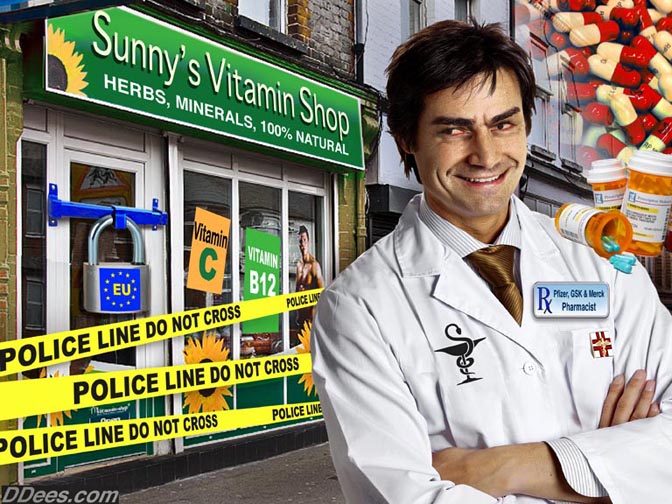Anti-depressants: Hormone of Happy or Hormone of Horror?
By Ben Fuchs | Red Pill Reports

(PharmacistBen) If you watch the cartoonish commercials on TV about depression and anti-depressants, you would think that the molecule known as serotonin is a biochemical of bliss and if you’re feeling crappy, you can just take a medicine that bumps up its effects and voila, you’ll be happy. On the other hand, if you go to websites like “SSRI stories.com”, which is filled with nightmarish tales about violent behavior, assaults, suicides, suicidal thoughts, murders, and school shootings all associated with SSRIs; or if you read the papers and listen to conspiracy theorists, it’s almost impossible not to be impressed by the link between all of this unpleasantness and drugs that affect serotonin levels. Even the package insert that comes with Prozac and Effexor and Zoloft and other SSRIs pharmaceuticals contain warnings from the purveyors of these poisons about side effects of self-harm and savagery that one would never think would be associated with a drug that’s supposed to make you jump for joy.
So which is it, hormone of happy or hormone of horror? If serotonin is indeed the chemical of calm that you hear about on commercials and if SSRI drugs are indeed the glee-inducing, depression-fighting drugs that your doctor tells you they are, why is that Lilly and Pfizer and all the other manufacturers of these substances are warning patients about side effects like suicide and violent and aggressive behavior?
Well, as it turns out, serotonin, despite what you may have heard, is far from a happiness and joy brain biochemical. While it’s true that serotonin is partially a brain-based neurotransmitter (nerve chemical), it is, involved in far more than cranial chemistry. While 3-4. per cent is located in the brain, in fact, serotonin is found pretty much in all the systems of the body including the blood, skin, lungs, liver, and reproductive organs. And, as it turns out, most of the serotonin, some 90 per cent (or more) is found in the intestines, where it stimulates digestive contractions.
One of the serotonin’s main roles is to help the body eliminate ingested food poisons. Stimulating contractions of digestive tract muscles is the way the body deals with stuff it wants to expel. This is why SSRIs are sometimes used as appetite suppressants; under the influence of serotonin, we just don’t feel like eating. It’s also why one of the most common side effects of SSRIs is digestive disorders, especially cramping, loose stools and diarrhea. And this promotion of intestinal contractions is a clue to the real role of serotonin.
You see, far from being the happy hormone marketers and medical people tell us it is, serotonin is an emergency response hormone. It is involved in helping the body deal with survival threats and challenges; in addition to the ingestion of toxins, it’s protective against circulatory distress, especially bleeding. The term serotonin actually refers to “toning” (tightening) of the “sero” (blood). Sero-tonin is so named because it was first discovered in clotting components that are found in the blood, the little cell fragments called platelets. Thus, serotonin is a major blood clotting and blood vessel contracting chemical. It coagulates the blood and increases blood pressure, essentially preparing the body for an emergency.
So, not only is serotonin not a happy hormone, it is actually a hormone of stress and vigilance. Its main role is to prepare the body to respond to emergency, whether such response requires emptying the digestive tract of poisons by causing intestinal contractions, blood clotting to prepare the body for a fight, hypertension, to prepare the body for a flight or hyper-vigilance to prepare the body for some kind of perceived impending attack.
Contrary to mythology, not only does serotonin NOT signal joy and bliss and happiness, but it actually sends a completely opposite signal, specifically one of preparation for the avoidance of impending doom! Any happiness is associated with serotonin is a result of the body elevating emotional response to prepare its owner for some kind of stress.
Serotonin is a hormone of alertness, and this is what accounts for its link to suicides and violent behaviors which are manifestations of the vigilance response gone crazy. Basically it tells the brain that the body’s survival is at stake; that the digestive tract and the circulatory system (the blood) are being threatened, that the life of the organism is at risk. When you take a drug like Prozac or Effexor or Zoloft or any SSRI type drug you are up-regulating the chemistry of threat and danger. In the short run this may have anti-depressant effects and one of the body’s responses to emergencies is elevations in mood; cortisol which is another stress-related hormone will do the same thing in small amounts. This is one of the ways that the body handles emergencies. Pharmacologically increasing serotonin may in the short run improve affect, but in the long run it will semi-permanently up-regulate the stress response system. In other words, it improves mood by up-regulating the chemistry of threat and danger, which is most certainly NOT a good thing! This is why some studies show that paranoia, aggression, and suicidal thoughts/suicides can be caused by drugs that increase the levels of this stress management chemical. And significantly, this is why rage and aggressive behaviors, violence and suicidal behavior can be associated with drugs that increase the activity of serotonin.
